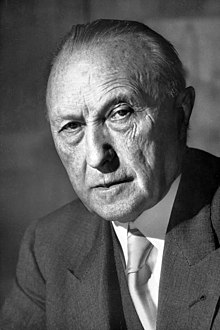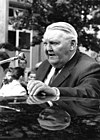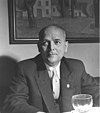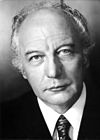Cabinet Adenauer IV
| Cabinet Adenauer IV | |
|---|---|
| 4. Cabinet of the Federal Republic of Germany | |

|
|
| Chancellor | Konrad Adenauer |
| Legislative period | 4th |
| Appointed by | Federal President Heinrich Lübke |
| education | November 14, 1961 |
| The End | December 14, 1962 |
| Duration | 1 year and 30 days |
| predecessor | Cabinet Adenauer III |
| successor | Cabinet Adenauer V |
| composition | |
| Party (s) | CDU, CSU, FDP |
| representation | |
| German Bundestag | 318/521 |
| Opposition leader | Erich Ollenhauer ( SPD ) |
The Adenauer IV cabinet was the German federal government in office from November 14, 1961 to December 14, 1962 in the fourth legislative period .
minister
Problems in forming a coalition
In the federal election on September 17, 1961 , the CDU / CSU received 251 seats, the SPD 203 and the FDP 67. A social-liberal and a grand coalition were possible and were also discussed. The FDP (it had already co-ruled in the Adenauer II cabinet ) opted for coalition negotiations with the CDU / CSU. There were disputes about the successor to Adenauer. Adenauer, then 85 years old, was known as "Chancellor on call", but was able to assert himself again, partly because there was no established succession plan.
One year after the cumbersome government formation, five ministers from the FDP and others from the Union were dismissed at their own request, as Adenauer refused to dismiss the two state secretaries Volkmar Hopf (CSU, Ministry of Defense) and Walter Strauss (CDU, Ministry of Justice). These were accused by the FDP of having orchestrated a police action against the editors of the news magazine Der Spiegel , which would later develop into the so-called Spiegel affair . In the end, Adenauer fired State Secretaries Hopf and Strauss to prevent further resignations and an expansion of the affair. His position was strengthened one last time within his own ranks; he had enough support to set up his fifth cabinet at the end of 1962 . The prerequisite for this, however, was, among other things, that Defense Minister Franz Josef Strauss (CSU), who was involved in the affair, no longer took over a department.
See also
Individual evidence
- ↑ Independent Federal Chancellor on Welt.de (accessed on January 1, 2010)
- ↑ a b Evelyn Schmidtke: The Chancellor tension between Chancellor democracy and democracy. A comparison of the government styles of Konrad Adenauer and Helmut Kohls, p. 136ff. Tectum Verlag 2001, ISBN 978-3828882782 ; Dissertation ( Chemnitz University of Technology , 2000)














